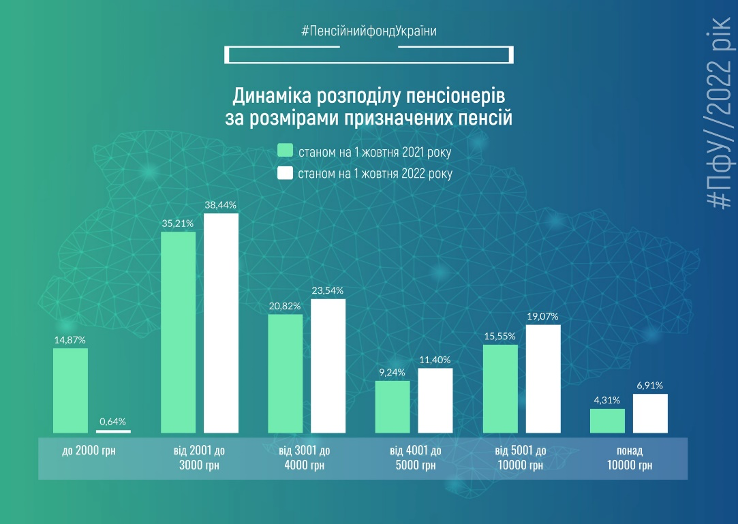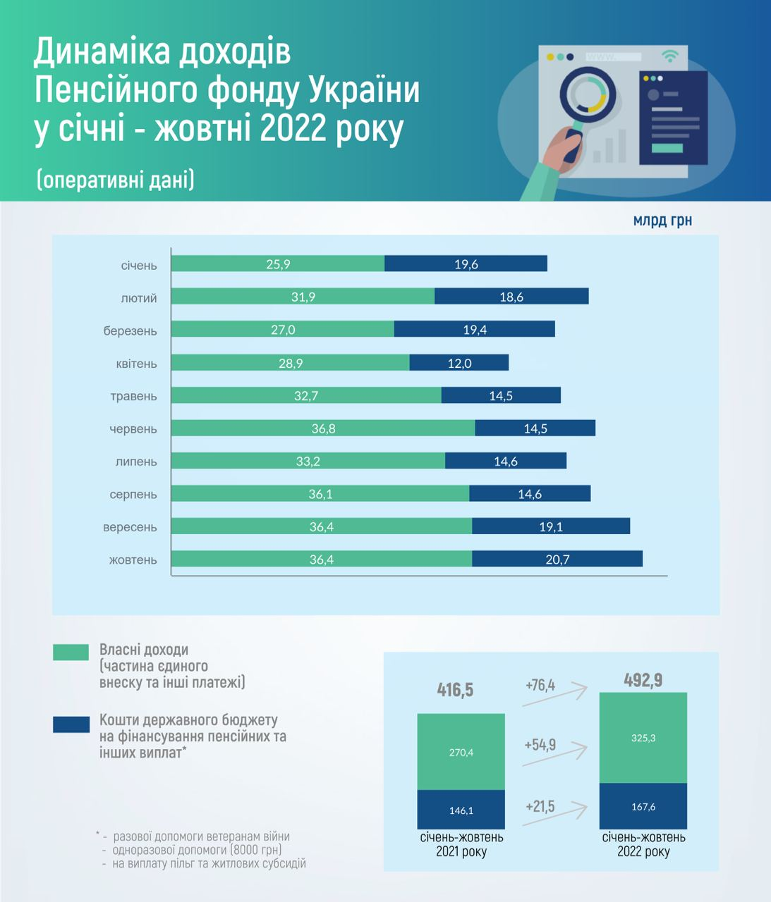With the deterioration of the wellbeing of the majority of the Ukrainian population caused by the Russian aggression, pensions acquire special relevance. The system of solidarity pension insurance in Ukraine is in crisis, and its future is uncertain.
General situation
According to the UN, Ukraine is among the top 15 countries with the highest rates of population decline. The UN forecasts that by 2050, the share of people in the age of 60+ will reach 32%. The ratio between the able-bodied population and pensioners will almost double. Demographic changes in Ukraine are generally in line with the global trends, but their pace is faster. Low birth rates and longer life expectancy seriously affect public finances, especially the pension system. Other conditions being equal, a reduction of the working-age population results in a decrease in the number of single social contribution payers, while expenditures on social security, including pensions, will rise with the increase in the share of elderly people.
According to the Pension Fund of Ukraine (PFU), as of October 1, there were 10.7 million pensioners in Ukraine. 2.7 million of them continue to work. The average pension is UAH 4,539.36, for working pensioners – UAH 4,759.20. 38.4% of pensioners receive payments ranging from UAH 2,001 up to UAH 3,000, another 23.5% — from UAH 3,001 to UAH 4,000.

The PFU is mainly filled by single social contributions, providing two-thirds of the PFU revenues. Employers and self-employed persons are the main payers of the single social contributions. According to the PFU data, the total number of insured persons paying single social contributions in June 2022 amounted to 10.73 million (in October 2021, the number of insured in the mandatory solidarity system of state pension insurance was 12.17 million people). 79.6% of them are employees, 12.1% are self-employed and farmers, 8.3% — other categories, including the military.
So, the ratio of those who pay single social contributions and pensioners is already one to one, that is, absolutely critical. Taking into account the war, the outflow of Ukrainian refugees and the rise of unemployment, the real picture is even worse.
Payment of the single social contribution also depends on taxes. The existing special tax regime in Ukraine, introduced to reduce the tax burden and encourage small businesses, leads to different amounts of VAT payments by (or for) individuals subject to the simplified and general taxation systems. If the employer has to pay a single social contribution of 22% per employee, an individual entrepreneur subject to the simplified taxation system, regardless of the amount of income, may pay the minimum amount of the single social contribution — 22% of the minimum wage.
For example, in October-December 2022, it is UAH 1,474 per month for an individual entrepreneur, or UAH 17,292 per year. Meanwhile, from the average salary of an employee (24,150 UAH), the employer pays 5,313 UAH per month or UAH 63,756 per year.
The single social contributions are insufficient to cover social expenditures. This requires regular extra funding of PFU from the state budget. During the nine months of 2022, PFU got UAH 147 billion from the state budget, while the fund's own revenues amounted to UAH 289 billion, or 66.4%.
Revenues of the State Pension Fund of Ukraine in January-October, 2022
UAH billion

At the same time, despite the critical financial condition of the PFU, there are initiatives to reduce taxes. For example, the Office of the President and the Ministry of Economy are working out a tax reform concept called "10-10-10", which provides for a significant reduction in VAT, corporate income tax, and personal income tax. It also envisages abolition of single social contributions. This will mean Ukraine’s adoption of an ultra-liberal taxation model, which now looks dubious, but is presented as the President’s initiative to make the country attractive for investment. Business, interested in lower taxes, conceptually supports such a reform, but where to get huge sums for pensions, sick leave and unemployment benefits then?
In case of cancellation of single social contributions, the government must decide how to pay pensions. Hence, the authorities are looking for alternatives to ensure payments for the solidarity pension system.
Simplified participation in pension insurance ("Law on Amendments to Some Laws of Ukraine on Simplifying the Mechanism for Participation in Mandatory State Pension Insurance").
According to the current legislation, in order to retire at the age of 60, it is necessary to have at least 30 years of work experience, at the age of 63 — 20 years, at 65 — from 15 to 20 years. One may either buy the pensionable service or work after the age of 60. The Law "On Mandatory State Pension Insurance" provides that those who do not have the necessary pensionable service period may voluntarily join the solidarity system or the funded system of pension insurance, or both systems simultaneously under an agreement on voluntary participation in mandatory state social insurance in line with the Law of Ukraine "On Collection and Account of Single Contributions to Mandatory State Social Insurance".
As we see, the current procedure of voluntary payment of a single contribution for the mandatory state pension insurance covers the vast majority of persons who do not have the pensionable service period sufficient to get a pension, and does not allow persons who are not satisfied with their share in mandatory state pension insurance to improve it.
So, the mandatory state pension insurance system should be transformed by expanding the list of participants (removing restrictions for working persons) and simplifying the implementation mechanism, using the capabilities of the Unified state web portal of electronic services (Diya) and the PFU web portal to apply for such participation, verify personal data, made an electronic agreement on voluntary participation. According to the explanatory note to the draft Law of Ukraine "On Amendments to Some Laws of Ukraine on Simplifying the Mechanism for Participation in Mandatory State Pension Insurance", charitable contributions may be both impersonal and personal.
A new law on simplifying the mechanism of participation in mandatory state pension insurance (Law on pensions in "Diya") was registered in parliament in August 2022 and adopted in the first reading and in general on November 4. This law is a compromise between mandatory funded pension insurance (that was never put to the vote) and voluntary funded pensions (voluntary funded pensions still exist, but in a different form — they are accumulated through non-state pension funds).
The main innovations of the Law on Simplifying the Mechanism for Participation in Mandatory State Pension Insurance include:
Voluntary payment of insurance premiums for mandatory state pension insurance. From the age of 16, citizens of Ukraine have the right to voluntary payment of insurance premiums for mandatory state pension insurance. The agreement on voluntary payment of insurance premiums can be made via Diya or the PFU electronic services portal.
Sponsored ("charitable") pensions. A legal entity or an individual can make a personal charitable contribution, that is, transfer money to the account of any person. But under the "sponsor" scheme, the pensioner will receive only 70% of savings, the rest will go to the PFU budget, i.e., the solidarity pension system. Interestingly, "sponsored" pensions may be impersonal. Therefore, people and businesses are offered to pay as much as they want.
When assessing this legislative initiative, an important question arises — it is not clear what will happen to this money next. The funded pension insurance scheme works when the money collected from payers is invested in some assets, to protect it from depreciation, ideally — to multiply it. But the new law does not say anything about this.
Treasury pension plan
The Verkhovna Rada also registered draft Law No. 7722 "On the Treasury Pension Plan", designed to transform the pension system from January 1, 2023, by "creating an additional support — a voluntary savings system that will allow citizens to make additional individual old-age pension savings through the Treasury."
Asset management will be carried out by the State Treasury. The State Treasury should strengthen guarantees for participants and remove fears of losing money in non-state pension funds.
The scheme of the law is the same as in the adopted Law "On Amendments to Some Laws of Ukraine on Simplifying the Mechanism for Participation in Mandatory State Pension Insurance": a citizen can top up his pension account by any amount and with any frequency. Anyone under 65 can participate in the program. The accumulated amount may be withdrawn as a lumpsum payment or monthly payments for 10 years or more. In the event of death, the money goes to the heirs, or to the state budget.
According to the State Statistics Service, in the 1st quarter real GDP fell by 15.1%, in the 2nd quarter the decline accelerated to 37.2%. Consumer prices rose by 23.8%. According to the Ministry of Economy, unemployment in 2022 is expected to reach 27.9%, the nominal average monthly salary will amount to UAH 14,025.00, i.e. it will remain at the pre-war level of 2021. Inflation will exceed 30%, and the dollar exchange rate jumped from UAH 26 to UAH 40. The question arises, where should pension savings be invested to save them from depreciation?
The general conclusion is that the financial prerequisites are unfavourable for the formation of the funded system in Ukraine. Therefore, it makes sense to start the introduction of the funded pension system only after the beginning of steady growth of Ukraine’s. Otherwise, the collected funds will not bring the desired profit, which will undermine the very idea of such pension insurance.
See the full text in Ukrainian at: https://razumkov.org.ua/statti/systema-pensiinogo-zabezpechennia-gromadian-chy-mozhna-vriatuvaty-pensii-dlia-ukraintsiv




